9 Aug 2018 | Events
[vc_row][vc_column][vc_single_image image=”102094″ img_size=”full” alignment=”center”][vc_column_text]Join London’s free-thinking comedy club, Comedy Unleashed, for an evening of uncensored comedy featuring:
Shappi Khorsandi
Shappi came 11th in last year’s ‘I’m A Celebrity Get Me Out of Here!’. But she’s also done some other things, which include Presidency of the Humanist Association, writing a novel, defending everyone’s right to free speech and fleeing the Iranian Islamic revolution as a child.
You already know that Shappi is a top comedian and a beautiful person. She’s great, come and see her in ‘unleashed mode’.
People Like Us
Julie Burchill and Jane Robin’s hilarious play about the chattering classes and their Brexit horror hits London theatreland in October. We will be treated to a live preview from the play.
Jay Handley
Jay pokes fun at unthinking orthodoxies and unpicks liberal pretensions. He was a hit at a previous Comedy Unleashed gig and, in response to many requests, we have given Jay a longer slot. Here’s a taster
Godfrey Elfwick Memorial Service, performed by Andrew Doyle
Elfwick was a brilliant Twitter caricature of the excesses of the liberal-left. He, or rather xe, identified as a ‘genderqueer Muslim atheist’ who was ‘born white in the #WrongSkin’. For some, the image of Godfrey on the Women’s March in a full burka and pink pussy that was a step too far. Godfrey has been banned by Twitter. This is our memorial to his life.
Red Richardson
Red Richardson sees Red.
Dan Evans – Compere
Dan is an overgrown kid who enjoys losing himself in surrealism. He won’t give you his life story or deliver well-rehearsed observational stories. Thank god for that.[/vc_column_text][vc_column_text]
When: Tuesday 11 September 2018, 7:30-10pm
Where: Backyard Comedy Club, 231 Cambridge Heath Road, London, E2 0EL (directions)
Tickets: £9-17
[/vc_column_text][/vc_column][/vc_row][vc_row][vc_column][vc_column_text]In partnership with[/vc_column_text][vc_row_inner][vc_column_inner][vc_single_image image=”102326″ img_size=”full” onclick=”custom_link” link=”http://comedyunleashed.co.uk/”][/vc_column_inner][/vc_row_inner][/vc_column][/vc_row]
20 Jun 2018 | Campaigns -- Featured, Statements, Turkey, Turkey Statements
[vc_row][vc_column][vc_column_text]Seventeen international freedom of expression and professional organisations have sent a joint letter with their demands for how to protect and strengthen media freedom and independent journalism in Turkey to all candidates in the upcoming presidential elections :
Your term starts in critical times. Freedom of expression in particular has declined drastically in the last couple of years in your country. To this day, more than 150 journalists remain in prison, thousands of critical thought leaders have lost their jobs and a large number of them have left the country.
We, the undersigned international freedom of expression and professional organisations, ask you to prioritise the following points in the upcoming term to uphold the rule of law and to protect and strengthen media freedom and independent journalism in Turkey:
– release all journalists who have been imprisoned for exercising their right to freedom of expression and their journalistic work and drop all charges against them.
– restore the impartiality of the judiciary and ensure the functioning of the Constitutional Court by refraining from exerting any political pressure on it and guaranteeing the implementation of its decisions.
– reform the system of criminal law that is currently being abused in order to prosecute and jail journalists, specifically the Penal Code and the Anti-Terror Law, which are among the main obstacles to freedom of the press and freedom of expression in Turkey.
– de-centralise and end state control of the regulation of media. Let media policy and media regulation processes be implemented by journalist associations, media representatives and academics, in compliance with the jurisprudence of the ECtHR.
– support the independence and pluralism of the media by redesigning ownership restrictions, support public broadcasting media to become free from political and economic interference, ensure media pluralism by subsidising small independent local media. Legal, political and administrative measures must be adopted to ensure free and fair competition in the media.
– reform and monitor the Press and Advertising Agency (Basın İlan Kurumu) to ensure that independent newspapers are not deprived of public advertising revenue. The appointment of media and internet regulatory bodies such as RTÜK and BTK should be transparent and must answer to the principles of media independence and freedom.
June 20th, 2018
Thank you for your attention.
Yours faithfully,
European Centre for Press and Media Freedom (ECPMF)
Association of European Journalists (AEJ)
Cartoonists Rights Network International (CRNI)
Danish PEN
European Federation of Journalists (EFJ)
German PEN
Global Editors Network (GEN)
Index on Censorship (Index)
International Press Institute (IPI)
Norwegian PEN
Osservatorio Balcani e Caucaso – Transeuropa (OBCT)
Ossigeno per l’Informazione (Ossigeno)
PEN America
Reporters Without Borders (RSF)
South East Europe Media Organisation (SEEMO)
Swedish PEN
World Association of Newspapers and News Publishers (WAN-IFRA)[/vc_column_text][vc_separator][vc_column_text]Türkiye Cumhuriyeti Cumhurbaşkanına Açık Mektup
17 uluslararası ifade hürriyeti kuruluşu, basın özgürlüğü ve bağımsız gazeteciliğin korunarak güçlendirilmesi adına taleplerini içeren ortak bir açık mektup yazarak 24 Haziran öncesi tüm cumhurbaşkanı adaylarıyla paylaştı.
“Döneminiz çok kritik bir zamanda başlıyor. Ülkenizde ifade hürriyeti özellikle son iki yılda büyük bir gerilemeye maruz kaldı. Bugüne kadar 150 gazeteci hapsedilmiş, binlerce muhalif fikir önderi işinden edilmiş ve çoğu ülkeyi terk etmiştir.
Biz aşağıda imzası bulunan uluslararası ifade hürriyeti kuruluşları olarak, önümüzdeki dönemde hukukun üstünlüğünü temel ilke edinerek ve Türkiye’de basın özgürlüğü ve bağımsız gazeteciliğin korunarak güçlendirilmesi için şu hususları öncelikli olarak dikkate almanızı rica ediyoruz:
-ifade hürriyeti hakkını kullanmış ve görevini yaptığı için hapsedilmiş tüm gazeteciler tahliye edilerek haklarında açılmış tüm davalar düşürülmeli,
-şu an gazetecileri yargılamak için kullanılan ceza hukukunda, özellikle de Türkiye’de basın özgürlüğü ve ifade hürriyeti önündeki ana engellerden olan Türk Ceza Kanunu ve Terörle Mücadele Yasasında bir reform yapılmalı,
-medya üzerinde devlet denetimini sonlandırılmalı ve yetkiler sorumlu kurumlara dağıtılmalı. Basın yasasının ve medyayı ilgilendiren düzenlemelerin gazetecilik kurumları, basın temsilcileri, akademisyenler tarafından Avrupa İnsan Hakları Mahkemesi yönetmelikleriyle uyumlu şekilde uygulanması sağlanmalı,
-bağımsız gazetecilik ve basında çoğulculuğu, medya sahipliği önündeki kısıtlamaları kaldırarak, kamu yayını yapan medya organlarının siyasi ve ekonomik müdahalelerden arındırılmasıyla, küçük ölçekli bağımsız yerel medya organlarına mali destek sağlayıp medyada çoğulculuğu sağlayarak desteklenmeli. Basında özgür ve adil bir ortam oluşturulabilmesi için gerekli yasal, siyasi ve idari adımlar atılmalı,
-bağımsız gazetelerin kamu reklam gelirlerinden mahrum kalmamasını sağlamak adına Basın İlan Kurumu reform edilerek denetlenmeli. RTÜK ve BTK gibi medya ve internet denetimi yapan kurumlara yapılan atamalarda şeffaflık olmalı ve basının bağımsızlığı ve özgürlüğü ilkelerine tabi olmalıdır.
20 Haziran 2018
İlginiz için teşekkür ederiz
Saygılarımızla,
Alman Yazarlar Birliği
Amerikan Yazarlar Birliği
Avrupa Basın ve Medya Özgürlüğü Merkezi ECPMF
Avrupa Gazeteciler Derneği AEJ
Avrupa Gazeteciler Federasyonu EFJ
Danimarka Yazarlar Birliği
Dünya Gazeteler ve Haber Yayıncıları Derneği WAN-IFRA
Global Editors Network GEN
Güneydoğu Avrupa Medya Kurumu
Index on Censorship
International Press Institute IPI
İsveç Yazarlar Birliği
Norveç Yazarlar Birliği
Ossigeno per l’Informazione
Sınır Tanımayan Gazeteciler RSF
Transeuropa – Osservatorio Balcani e Caucaso OBCT
Uluslararası Karikatürist Hakları Ağı CRNI[/vc_column_text][/vc_column][/vc_row][vc_row][vc_column][three_column_post title=”Turkey” full_width_heading=”true” category_id=”55″][/vc_column][/vc_row]
8 Jun 2018 | Americas, Artistic Freedom, Awards, Cuba, Fellowship, Fellowship 2018, News and features
[vc_row][vc_column][vc_column_text]
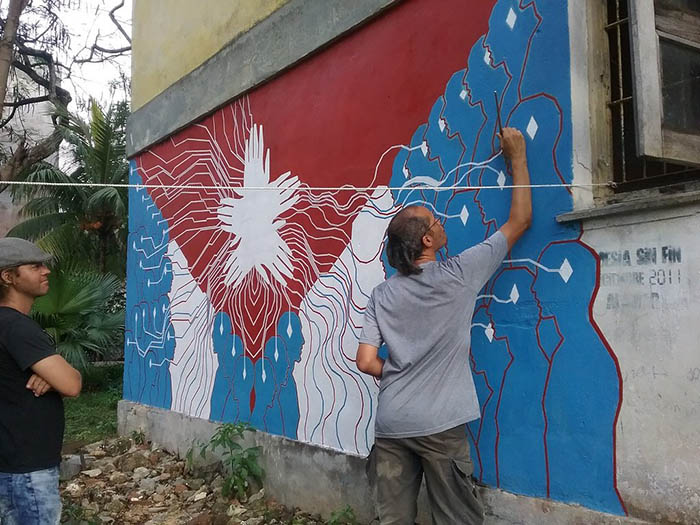
Cuban artist Yasser Castellanos
Despite official efforts to stop it in its tracks, Cuba saw the successful completion of its first independent art biennial, organised without the support of the state, on 15 May. Artist Luis Manuel Otero Alcantara and curator Yanelys Nuñez Leyva, members of the Museum of Dissidence, winner of the 2018 Index on Censorship Freedom of Expression Award for art, organised the ten-day #00Bienal de la Habana, which included over 170 artists, writers, musicians and theorists across nine different exhibitions in artists’ homes and studios around the country’s capital.
“Cuban culture is centralised culture and the government has absolute control,” Nuñez Leyva tells Index on Censorship. “The Ministry of Culture, together with all its branches such as the Union of Writers and Artists of Cuba and the National Council of Plastic Arts, are tentacles of the Ministry of the Interior, so all independent proposals, whether cultural, ecological or campaigns against gender violence, for example, are cursed with all the might of the government-controlled media.”
Even at schools pupils are served up propaganda intent on turning them against non-state-approved artists. Some art school students were shown a video portraying Otero Alcantara as a mercenary. “Such a campaign inevitably generates fear around independent projects which then suffer due to lack of both social and economic support,” Nuñez Leyva says.
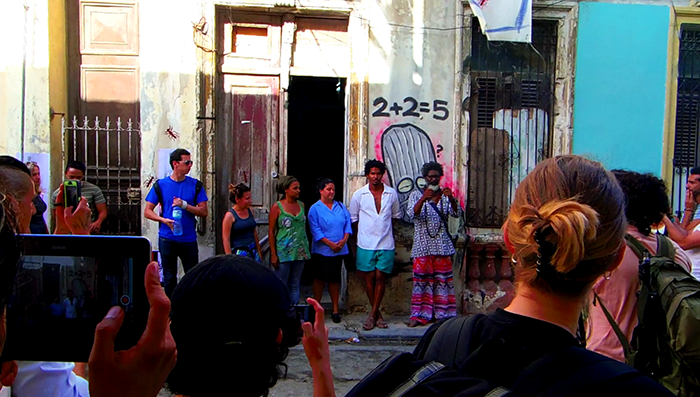
Economic support was one of the biggest obstacles for #00Bienal. “At the beginning, we thought that we would produce it with what we had at hand, but along the way we realised that we needed more,” Nuñez Leyva says. So a Gofundme campaign was set up, which raised $6,574. “But this wasn’t easy: the impact of the US blockade, our isolation from the world of networks and the impossibility of having credit cards made the process anguishing.”
Otero Alcantara was also imprisoned without cause on several occasions as part of the Cuban government’s campaign of harassment. Others who took part in #00Bienal, whether Cuban or foreign, received similar harassment. Many were even denied entry to the country, including the Cuban-American artist Coco Fusco.
When #00Biennial was announced in September 2017, the Cuban government immediately began to show its discontent through its cultural institutions. In an official declaration they branded the organisers as “unscrupulous people”. In response, #00Bienal’s first slogan was: “From the official to the unscrupulous.”
As culture is so tightly controlled in Cuba, only artists seen to be working in the interests of the regime can operate without restriction. Approved artists usually receive perks, something that gives them a higher status in society. Some artists risked all of this by taking part in #00Bienal. “The system used the worst blackmail against them because they gave the event a legitimacy that the government did not want,” Otero Alcantara says. “These artists were threatened by having their government accreditation taken away. Without this, they would find themselves without ‘official work’.”
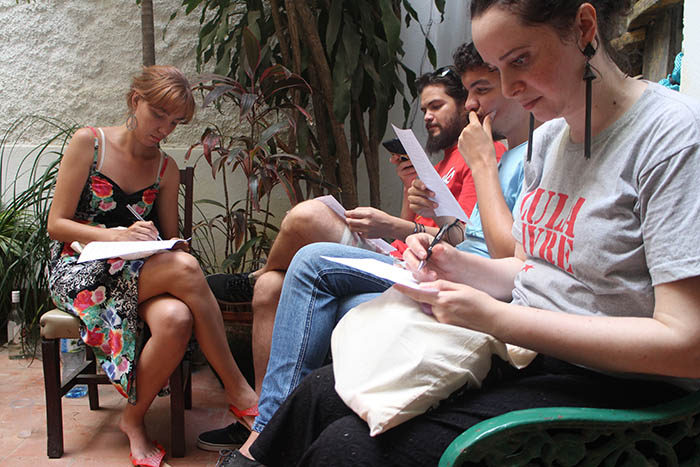
Government agents stalked the exhibitions while the organisers were accused of being in league with Cuba’s enemies. How does one respond to such accusations? “We responded by making an event that is as honest as possible, with a wide range of manifestations and artistic expressions that reflected the reality of Cuban art,” Nuñez Leyva says. “We responded with a list of more than 170 participants, not only Cubans, but from Mexico, Spain, Germany, the United States, Romania, Angola, Colombia, Denmark, Ukraine, Brazil, Venezuela, among them high-profile artists that Cuban institutions admire and collaborated with.”
The authorities even tried to prohibit the public from attending, sometimes successfully. Flyers and stickers were also confiscated. “But none of these actions were ever going to stop the energy of the event,” Otero Alcantara says.
“Despite all this pressure, the event went ahead, demonstrating that there is a group of people who are very courageous and have a real commitment culture,” Nuñez Leyva says. #00Bienal helped revive “a spirit of alternative rebellion” through the involvement of “countless numbers of totally unknown artists” that the state would never endorse.
For Otero Alcantara, the event’s success lies in the cohesion it created between artists, scholars and art enthusiasts, something that is unprecedented in the world of Cuban art. “We built an inclusive space of free creation and true collaboration between the people involved, exhibited the work of artists who were never going to have space in an official Havana Biennial and set a precedent for future projects,” he says. “This is one more step towards eliminating a fear that exists throughout Cuba.”
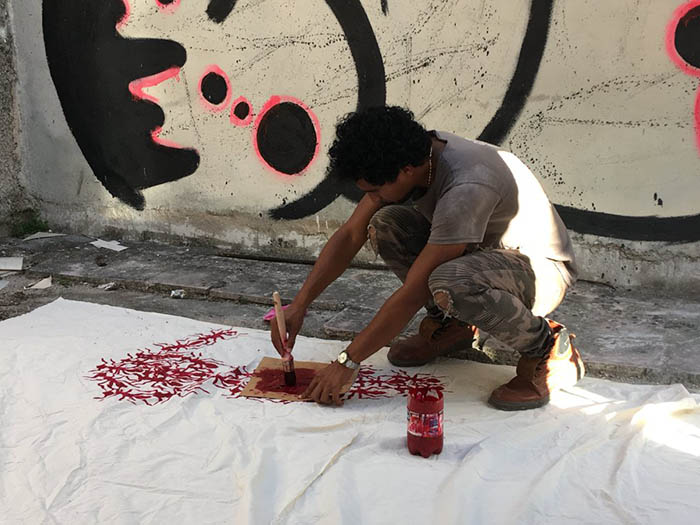
According to the organisers, the terms “revolution” or “revolutionary” have been hijacked and distorted by the Cuban regime. Such deformation has taken root so deep in the imagination of the Cuban people that just by mentioning the word “dissidence” is enough to be shunned, they explain.
“The #00Bienal was a humanistic project that brought to the fore essential values for any society such as unity, solidarity and collaboration,” Nuñez Leyva says. “The event also favoured the less privileged and created beauty and dialogue in favour of a new Cuba.”
The organisers of #00Bienal are under no illusions that life for Cuba’a dissident artists will magically become any easier under Cuba’s new president, Miguel Díaz‑Canel, who took over from Raúl Castro in April 2018. “The Cuban regime is more than any Castro,” Nuñez Leyva says. “It is a system based on a group of families that live both inside and outside the island, who have control over everything, which ultimately contributes to their own wealth.” This corrupt system relies on the deception of a people who have been left without even the strength even to protect themselves against poverty, she adds. “This situation leaves us with little hope, but we have to keep working.”
Otero Alcantara and Nuñez Leyva’s now want to show that #00Bienal wasn’t just a one-off, but is a serious project with longevity. “We will see if it is possible in two years to achieve something similar,” Otero Alcantara says.[/vc_column_text][/vc_column][/vc_row][vc_row][vc_column][vc_media_grid grid_id=”vc_gid:1528443291288-dfd45bff-0a16-7″ include=”100716,100712,100711,100710,100713,100709,100708,100707,100706,100704,100715,100705″][/vc_column][/vc_row][vc_row][vc_column][vc_column_text]
Artists, writers, musicians and theorists who took part in #00Bienal
Amaury Pacheco (Cuba), Iris Ruiz (Cuba), Coco Fusco (Cuba-USA), Tania Bruguera (Cuba), Reynier Leyva Novo (Cuba), Ernesto Oroza (Cuba), Gerardo Mosquera (Cuba), Katherine Bisquet (Cuba), Jose Ernesto Alonso, Yuri Obregón (Cuba), Alein Somonte (Cuba), Alejandro Barreras (Cuba), Anaeli Ibarra (Cuba), Alejandro Taquechel (Cuba), Ariel Maceo Tellez (Cuba), Aryam (Cuba), Aldeide Delgado (Cuba), Armando Cuspinera (Mexico), Antonio Mas (Spain), Alicia Torres (Spain), Ana Olema (Cuba), Alexis Ruiseco (Cuba-USA), Alexandru Raevschi (Germany), Andrés X (Cuba), Alain Aspiolea (Cuba), Alexandre Arrechea (Cuba), Antoni Muntadas (Spain), Biennial Project (USA), Boris González Arenas (Cuba), Colectivo Corason i uevo (Antonio A. Orta, Maykel Almenteros y Pedro Pablo Bacallao) (Cuba), Colectivo Guerrillas Girls, Celia y Yunior (Cuba), Colectivo 2.50 (Ana Gómez, Argelia Leodegarío, Marco Antonio Rodríguez, Itandehuitl Orta, Yuvia Pérez, Esmeralda Pérez) (Mexico), Carlos Manuel Álvarez (Cuba), Clara Astiasarán, Chu (Cuba), David de Omni, David León (Cuba), Danilo Maldonado (El Sexto), Diego Gil (Spain), Eliecer Jiménez Almeida (Cuba), Erish (Mexico), El Oficio (Cuba), Ernesto Hernandez Busto, Enfori García, Filipa César (Portugal), Fabián (2+2 =5) (Cuba), Francis Sánchez (Cuba), Francisco Méndez (Mexico), Francisco Masó (Cuba), Fabian Martínez, Filio Gálvez, Fredric Snitzer, Gabriel Coto (Cuba), Gerardo Stübing (España), Gean Moreno, Henri Eric Hernández (Cuba), Hamlet Lavastida (Cuba), Héctor Trujillo (Cuba), Hugo Patao, Italo Expósito (Cuba), Iván de la Nuez (Cuba), Jesús Hdez-Güero (Cuba), Jesús Benítez (Mexico), José Luis Marrero (Cuba), Josvan Gonzalez Agramonte (Cuba), Julián Yunda Yepes (Mexico), Jenifer Acuña (Cuba), Juan Melo (Colombia), Juan Carlos Alvarez Miranda (Cuba), Jean-Lorin Sterian (Romania), José Bedia (Cuba), Julio César Llopiz (Cuba), Javier Marimón, José Manuel Mesías (Cuba), Keyezua (Angola), Kevin Arrow, Lía Villares (Cuba), Luis Trápaga (Cuba), Luiso, Leandro Villanueva (Sam 33) (Cuba), Lester Dubé (Cuba), Lala Misosniky (Romania), La Alianza (Cuba), Liliam Dooley, Leandro Feal (Cuba), Lourdes Porrata, Miquel García (Spain), Marisol Maza (Mexico), Marcel Marquez (Cuba), Marianna Liosi (Germany), MO colectivo (Mariam Abrajim y Octavio Salazar) (Colombia), Magdiel Aspillaga, Mysora García, Nonardo Perea (Cuba), Natalia López (Colombia), Osmel Almaguer Delgado (Cuba), Osmany Carratalá (Cuba), Oscar Salamanca (Colombia), Orlando Hernández (Cuba), Pablo Pinto (Colombia), Polyanna Morgana (Brazil), Political Architecture: Critical Sustainability (PA:CS) (Denmark), Peter Menéndez, Rafael Carabano (Venezuela), Raúl Meriño (Cuba), Ras Yoe, Ricardo Figueredo, Rodolfo Peraza (Cuba), Rafael Domenech, Rirkrit Tiravanija, Svitlana Biedarieva (Ukraine), Soandry del Río (Cuba), Sandra Ceballos (Cuba), Santiago Alvarez Méndez (Colombia), Sandor (Cuba), Thiago Morandi (Brazil), Tomás Sánchez (Cuba), Tomas Vu, Tonel (Cuba), unx Pardo Ibarra (Colombia), Ulises Valdés (Mexico), Walfrido Valera (Cuba), Yaima Pardo (Cuba), Yasser Castellanos (Cuba), Yesica Suárez (Colombia), Yulier P. (Cuba), Yoenis Eloy Mayeta (Cuba), Yimi Konclase (Cuba), Yvelin Buenrostro (Mexico), Yucef Merhi (Venezuela), Yornel Martínez (Cuba), Yali Romagoza (Cuba), Yanier H. Palao (Cuba).[/vc_column_text][/vc_column][/vc_row][vc_row][vc_column][vc_basic_grid post_type=”post” max_items=”4″ element_width=”6″ grid_id=”vc_gid:1528443291296-0ad2c295-a239-7″ taxonomies=”104″][/vc_column][/vc_row]

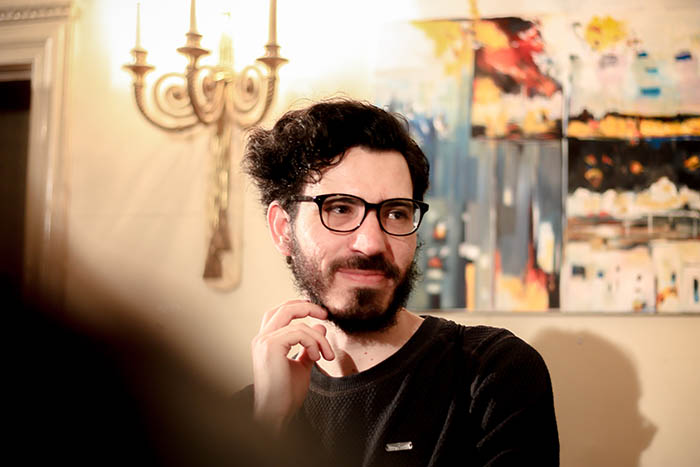 [/vc_column_text][/vc_column_inner][/vc_row_inner][/vc_column][/vc_row][vc_row][vc_column][vc_column_text]
[/vc_column_text][/vc_column_inner][/vc_row_inner][/vc_column][/vc_row][vc_row][vc_column][vc_column_text]


